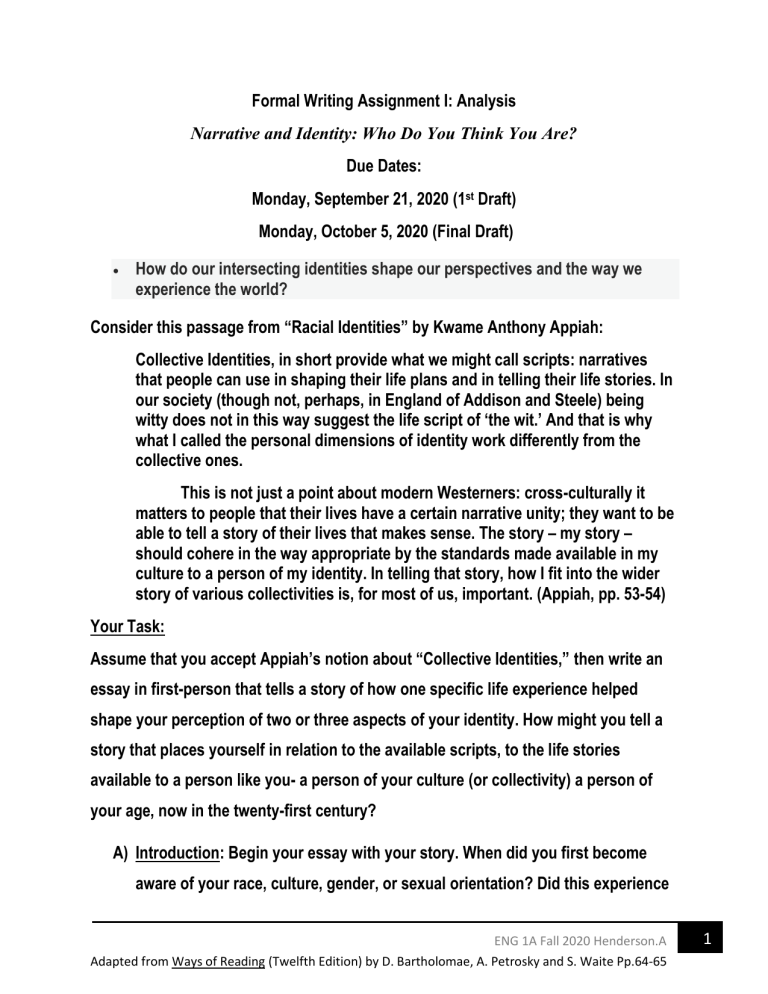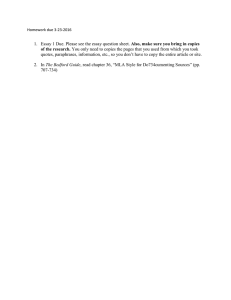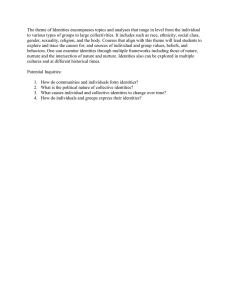
Formal Writing Assignment I: Analysis Narrative and Identity: Who Do You Think You Are? Due Dates: Monday, September 21, 2020 (1st Draft) Monday, October 5, 2020 (Final Draft) How do our intersecting identities shape our perspectives and the way we experience the world? Consider this passage from “Racial Identities” by Kwame Anthony Appiah: Collective Identities, in short provide what we might call scripts: narratives that people can use in shaping their life plans and in telling their life stories. In our society (though not, perhaps, in England of Addison and Steele) being witty does not in this way suggest the life script of ‘the wit.’ And that is why what I called the personal dimensions of identity work differently from the collective ones. This is not just a point about modern Westerners: cross-culturally it matters to people that their lives have a certain narrative unity; they want to be able to tell a story of their lives that makes sense. The story – my story – should cohere in the way appropriate by the standards made available in my culture to a person of my identity. In telling that story, how I fit into the wider story of various collectivities is, for most of us, important. (Appiah, pp. 53-54) Your Task: Assume that you accept Appiah’s notion about “Collective Identities,” then write an essay in first-person that tells a story of how one specific life experience helped shape your perception of two or three aspects of your identity. How might you tell a story that places yourself in relation to the available scripts, to the life stories available to a person like you- a person of your culture (or collectivity) a person of your age, now in the twenty-first century? A) Introduction: Begin your essay with your story. When did you first become aware of your race, culture, gender, or sexual orientation? Did this experience ENG 1A Fall 2020 Henderson.A Adapted from Ways of Reading (Twelfth Edition) by D. Bartholomae, A. Petrosky and S. Waite Pp.64-65 1 have positive or negative effects on your self-esteem? Why? Then briefly summarize Appiah’s essay “Racial Identities.” Introduce the reader to Appiah and the overall theme of his essay. Finally, end your Introduction with a clear Thesis Statement that answers the questions: How has my life experience(s) shaped the perception of my identity? Why does it matter? B) Body Paragraphs: Your essay should contain three to four complete body paragraphs written in PIE structure with a (Point) clear topic sentences, (Information) direct quotes or paraphrases from Appiah’s “Racial Identities” followed by thorough Explanation of the chosen quotes or paraphrases that supports your thesis statement. You must use at least three but no more than five direct quotes or paraphrases. C) Conclusion: Don’t simply summarize the main idea of your essay. Tell the reader how your story (shared in your Introduction) has evolved over time. Perhaps you shared a story that traumatized you initially, but over time has fortified your courage and self-esteem. Explain how that process has changed you. Perhaps your story is a relatively recent event. How might your “collective identities” be reshaped by your evolving perceptions of yourself and your place in community / society? For example, if the focus of your “collective identities” are race and gender, how have your experiences influenced your perception of these specific aspects of your overall identity? ENG 1A Fall 2020 Henderson.A Adapted from Ways of Reading (Twelfth Edition) by D. Bartholomae, A. Petrosky and S. Waite Pp.64-65 2


